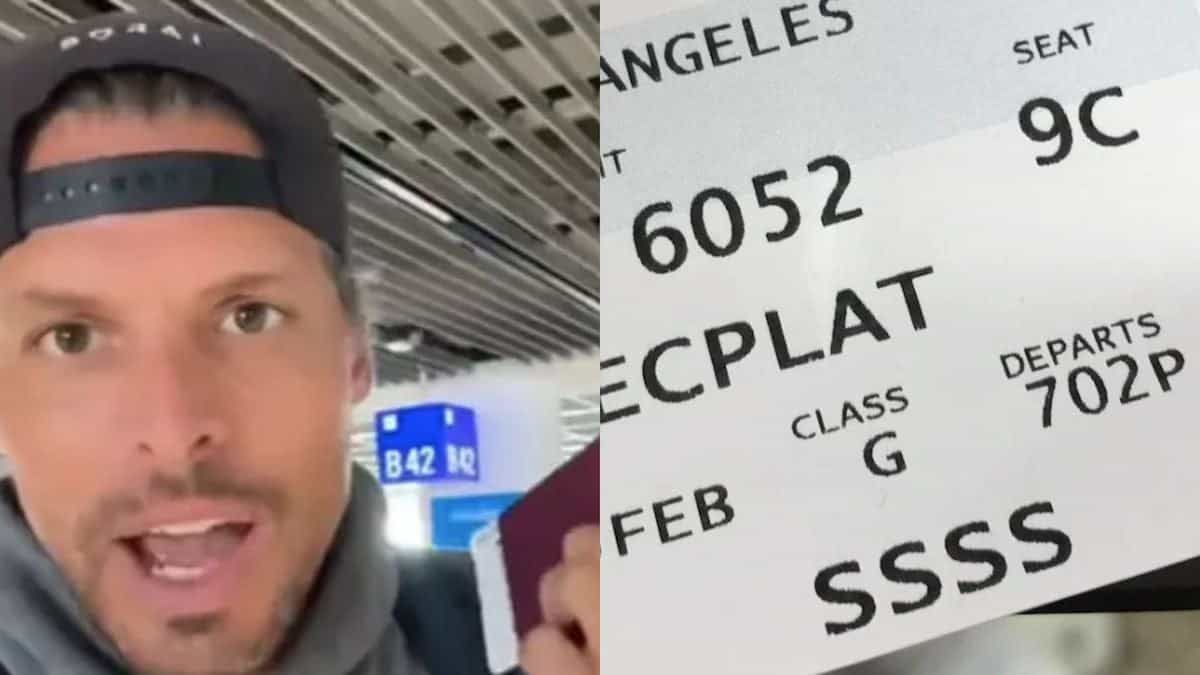Show table of content Hide table of content
Flying to the United States can sometimes come with unexpected surprises, especially when travelers discover the mysterious “SSSS” code printed on their boarding passes. This four-letter combination has earned a reputation as the “kiss of death” among frequent flyers, causing anxiety for many international travelers. But what does this code actually mean, and should you be concerned if it appears on your travel documents?
Decoding the mysterious SSSS marking on boarding passes
The SSSS code stands for “Secondary Security Screening Selection” and was implemented by the Transportation Security Administration (TSA) following the September 11 attacks. This security measure identifies passengers who require additional screening before boarding flights to the United States.
Travel influencer Tom Grond, known online as Traveltomtom, recently shared his first-hand experience with this security protocol. Despite taking over 100 flights annually, Grond encountered the SSSS designation for the first time at Frankfurt Airport while preparing to board a flight to the US.
“I was quite surprised when I noticed the code on my boarding pass,” Grond explained in his viral TikTok video. “Many travelers consider this the ‘kiss of death’ for their journey, but the reality is far less dramatic than the reputation suggests.”
Several factors can trigger the SSSS designation. Passengers who book last-minute travel, purchase tickets with cash, or have recently visited countries deemed high-risk might find themselves selected. Additionally, the TSA implements random selection to maintain unpredictable security protocols, similar to how airport security gates sometimes identify unusual items in passengers’ belongings.
The presence of this code doesn’t necessarily indicate suspicion of wrongdoing. Rather, it’s part of a comprehensive system designed to enhance aviation security through layered and sometimes unpredictable screening procedures.
What happens during secondary security screening
When travelers discover the SSSS code on their boarding pass, they’re directed to undergo additional security measures beyond the standard procedures. According to Grond’s documentation of his experience, the process was straightforward and efficient.
“You’re taken to a separate area where security agents collect samples from your clothing, shoes, and bags,” he explained. “They also conduct a more thorough inspection of your carry-on items, but the entire process moves relatively quickly.”
Security officers use specialized equipment to test for traces of prohibited substances. They may also conduct more detailed baggage examinations and enhanced pat-downs. These additional measures help ensure that no potential threats make it onto aircraft, much like the requirement for smartphones to be in airplane mode during flights.
What surprised Grond most was his experience upon arrival in the United States. Despite having stamps from countries like Iran and Iraq in his passport—destinations often subjected to heightened scrutiny—customs officers asked minimal questions. They simply verified he had nothing to declare before allowing him to proceed.
“The additional screening before departure actually seemed to streamline my entry process,” Grond noted. “It appeared that US customs officers took into account that I had already successfully completed the enhanced security protocols.”
Travel On this tourist-favorite island, hiking trails are becoming paid for a good reason.
This suggests that the SSSS program may actually benefit travelers by front-loading security procedures, potentially resulting in fewer delays during the immigration process. While some travelers might fear being subjected to aggressive questioning about previous travel experiences, Grond’s experience indicates this isn’t necessarily the case.
Managing expectations for international travelers
Understanding what the SSSS designation means can significantly reduce travel anxiety. Despite its intimidating reputation, the additional screening represents a routine security procedure rather than a cause for alarm.
When preparing for international travel, particularly to the United States, travelers should allow extra time at the airport if they discover this code on their boarding pass. The additional screening typically adds 15-30 minutes to the pre-boarding process, depending on airport congestion.
Maintaining a cooperative attitude greatly improves the experience. While some travelers might become frustrated or anxious when selected, security personnel are simply performing necessary duties to maintain aviation safety. Unlike unruly passenger incidents that cause flight disruptions, complying with security protocols helps ensure smooth operations.
Travelers should also know their rights during screening. While security agents have authority to conduct thorough inspections, passengers can request private screenings if pat-downs are required. They may also ask for explanations about specific procedures, though security personnel might not be able to disclose all operational details.
For those planning trips to popular destinations like Cologne, Germany for Christmas holidays, being prepared for potential security measures can make international travel less stressful.
The broader context of aviation security
The SSSS designation exists within a comprehensive framework of aviation security measures implemented globally. These protocols aim to prevent incidents ranging from minor disturbances to major security threats.
While rare, serious security breaches do occasionally occur, such as when passengers become violent toward flight crew. The secondary screening process helps identify potential risks before they board aircraft.
Travel This little-known city is a nightmare for drivers, they lose 15 days a year in traffic jams.
Aviation security continues to evolve in response to emerging threats. Just as passengers must remain vigilant about unexpected dangers in everyday situations, security agencies continually refine their approaches to protect travelers.
For most travelers, encountering the SSSS code will be a rare occurrence. Tom Grond’s experience—having the designation appear only once despite taking hundreds of flights—suggests the selection process impacts a relatively small percentage of passengers.
Rather than dreading this security measure, international travelers can view it as one of many systems working to ensure their safety. By understanding what the process entails, passengers can approach the situation with confidence rather than apprehension, making their journey to the United States smoother and less stressful.


